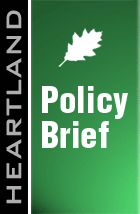Introduction
The economic recession that began in 2007 exposed and aggravated a government fiscal crisis that had been brewing for many years at the national, state, and municipal levels of the U.S. Slow or negative economic growth, falling housing values, and rising government spending came together to make it impossible to hide the extent to which governments are borrowing to pay for current operations and shortchanging their workers’ pension funds.
Municipalities and other taxing districts in Cook County are raising taxes faster and falling much deeper in debt than is widely understood.While many studies have analyzed the current debt level of the federal government and to a lesser extent that of state governments, less attention has been paid to how this is playing out at the county and municipal levels.
Cook County, Illinois – the second-most populous county in the United States and home to the City of Chicago – was hit hard by the recession and collapse of the housing bubble, but no harder than many other counties. What makes the county unique is a series of ordinances requiring taxing jurisdictions in the county to file with the county treasurer reports making their financial situations transparent.
Maria Pappas, Cook County treasurer, has discovered that municipalities and other taxing districts in Cook County are raising taxes faster and nevertheless falling much deeper in debt than is widely understood, even by elected officials in Cook County. The results of the treasurer’s initial research produced national attention from the news media as well as bond rating agencies and elected officials.
Findings
Property taxes collections roses 48 percent from 2000 to 2010, twice the rate of inflation during that period.The Heartland Institute collected public tax records from the treasurer’s office using the Freedom of Information Act (FOIA). Heartland acknowledges and thanks the treasurer’s office for its cooperation and assistance. The conclusions and interpretations reported here are solely the responsibility of The Heartland Institute.
The current report focuses on levies – the amount of property taxes a government collects from property owners annually. Individual taxpayers face higher or lower rates of change in their tax bills based on many variables. Our analysis finds that from 2000 to 2010:
- Property taxes collected for all taxing districts in Cook County rose from $7.89 billion to $11.69 billion, an increase of 48 percent. This is twice the rate of inflation during that period.
- Suburban municipalities increased property taxes by 75 percent, taxing agencies located within the City of Chicago by 44 percent, and the Metropolitan Water Reclamation District by 29 percent. Property taxes levied by Cook County government remained flat.
- School districts, which collect the largest portion of property taxes, increased property taxes by 58 percent. Twenty-seven school districts more than doubled their levies in the past decade.
(Download the PDF to read the whole report.)




